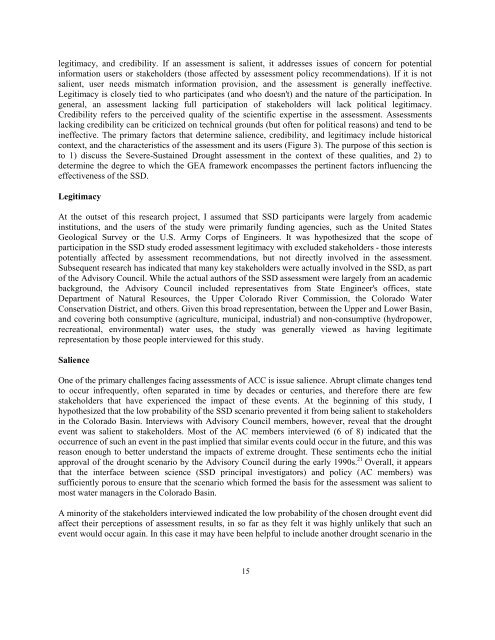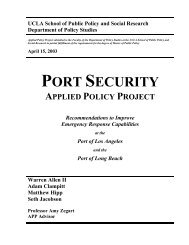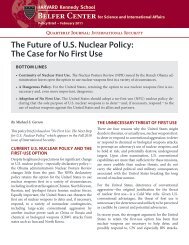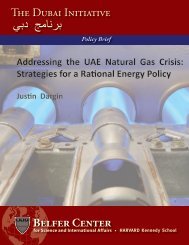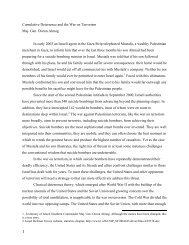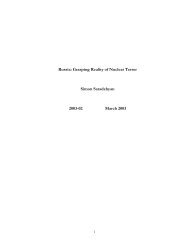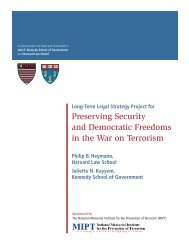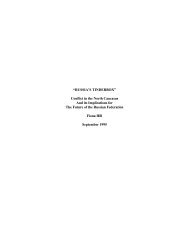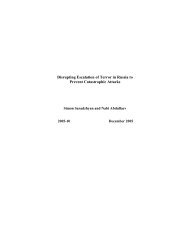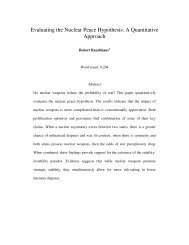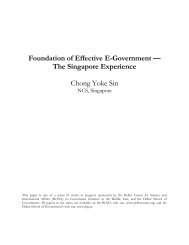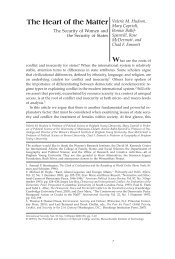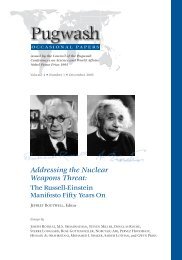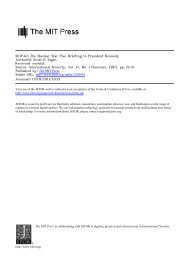Global Environmental Assessment Project - Belfer Center for ...
Global Environmental Assessment Project - Belfer Center for ...
Global Environmental Assessment Project - Belfer Center for ...
You also want an ePaper? Increase the reach of your titles
YUMPU automatically turns print PDFs into web optimized ePapers that Google loves.
legitimacy, and credibility. If an assessment is salient, it addresses issues of concern <strong>for</strong> potential<br />
in<strong>for</strong>mation users or stakeholders (those affected by assessment policy recommendations). If it is not<br />
salient, user needs mismatch in<strong>for</strong>mation provision, and the assessment is generally ineffective.<br />
Legitimacy is closely tied to who participates (and who doesn't) and the nature of the participation. In<br />
general, an assessment lacking full participation of stakeholders will lack political legitimacy.<br />
Credibility refers to the perceived quality of the scientific expertise in the assessment. <strong>Assessment</strong>s<br />
lacking credibility can be criticized on technical grounds (but often <strong>for</strong> political reasons) and tend to be<br />
ineffective. The primary factors that determine salience, credibility, and legitimacy include historical<br />
context, and the characteristics of the assessment and its users (Figure 3). The purpose of this section is<br />
to 1) discuss the Severe-Sustained Drought assessment in the context of these qualities, and 2) to<br />
determine the degree to which the GEA framework encompasses the pertinent factors influencing the<br />
effectiveness of the SSD.<br />
Legitimacy<br />
At the outset of this research project, I assumed that SSD participants were largely from academic<br />
institutions, and the users of the study were primarily funding agencies, such as the United States<br />
Geological Survey or the U.S. Army Corps of Engineers. It was hypothesized that the scope of<br />
participation in the SSD study eroded assessment legitimacy with excluded stakeholders - those interests<br />
potentially affected by assessment recommendations, but not directly involved in the assessment.<br />
Subsequent research has indicated that many key stakeholders were actually involved in the SSD, as part<br />
of the Advisory Council. While the actual authors of the SSD assessment were largely from an academic<br />
background, the Advisory Council included representatives from State Engineer's offices, state<br />
Department of Natural Resources, the Upper Colorado River Commission, the Colorado Water<br />
Conservation District, and others. Given this broad representation, between the Upper and Lower Basin,<br />
and covering both consumptive (agriculture, municipal, industrial) and non-consumptive (hydropower,<br />
recreational, environmental) water uses, the study was generally viewed as having legitimate<br />
representation by those people interviewed <strong>for</strong> this study.<br />
Salience<br />
One of the primary challenges facing assessments of ACC is issue salience. Abrupt climate changes tend<br />
to occur infrequently, often separated in time by decades or centuries, and there<strong>for</strong>e there are few<br />
stakeholders that have experienced the impact of these events. At the beginning of this study, I<br />
hypothesized that the low probability of the SSD scenario prevented it from being salient to stakeholders<br />
in the Colorado Basin. Interviews with Advisory Council members, however, reveal that the drought<br />
event was salient to stakeholders. Most of the AC members interviewed (6 of 8) indicated that the<br />
occurrence of such an event in the past implied that similar events could occur in the future, and this was<br />
reason enough to better understand the impacts of extreme drought. These sentiments echo the initial<br />
approval of the drought scenario by the Advisory Council during the early 1990s. 21 Overall, it appears<br />
that the interface between science (SSD principal investigators) and policy (AC members) was<br />
sufficiently porous to ensure that the scenario which <strong>for</strong>med the basis <strong>for</strong> the assessment was salient to<br />
most water managers in the Colorado Basin.<br />
A minority of the stakeholders interviewed indicated the low probability of the chosen drought event did<br />
affect their perceptions of assessment results, in so far as they felt it was highly unlikely that such an<br />
event would occur again. In this case it may have been helpful to include another drought scenario in the<br />
15


